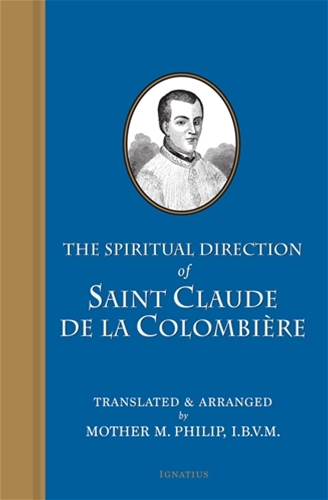St. Claude: ‘Hope on to the End’
BOOK PICK: The Spiritual Direction of St. Claude de la Colombiere

THE SPIRITUAL DIRECTION OF ST. CLAUDE DE LA COLOMBIÈRE
Translated and arranged by Mother M. Philip, I.B.V.M.
Ignatius, 2018
172 pages, $15.95
To order: ignatius.com (800) 651-1531
St. Claude de la Colombière (1641-1682) was a French Jesuit priest who was canonized by St. John Paul II in 1992. He is best known as the confessor of St. Margaret Mary Alacoque, to whom the Lord had revealed devotion to his Sacred Heart.
Colombière also undertook a mission to England (1676-79) as preacher to the Duchess of York, a delicate task, given England’s religious and political upheavals. In about a decade, William and Mary would lead the “Glorious Revolution” to ensconce Protestant supremacy.
Renowned as a great spiritual director, this book is a collection of Colombière’s reflections on various aspects of the spiritual life, culled from his writings and preaching. It originally appeared in 1934, was republished by Ignatius in 1998 and now, in a third edition, continues making Colombière’s thought accessible to readers now.

Colombière covers the range of key spiritual issues: Mass, confession, Communion, prayer, holiness, temptations, faith, confidence in God’s will, love of neighbor, spiritual joy, duties of one’s state in life, mortification, Christian education of children, etc. Part II (about one-third of the book) is directed to religious, addressing vocation, religious vows, observance of the rule, prayer, peace of soul, generosity in God’s service, pusillanimity, tepidity, making a retreat and when there is a change in superior. Every topic, ranging from one to five pages, is treated in a number of short extracts.
My experience of Jesuits is their capacity to be terse and to the point: Colombière fits the bill. Here’s what he says on spiritual direction:
“Half an hour a month in which to give an account of your prayer and dispositions should suffice and would be real direction: for it is mere waste of time and real illusion to expect endless visits ...; self is satisfied and self is distracted by so much talk, but God is left alone, and it is with him alone that we ought to try and be united.”
Here is his take on the Holy Mass: “God is more honored by a single Mass than he could be by all actions of angels and men together, however fervent and heroic they may be. Yet how few hear Mass with the intention of giving God this sublime honor! How few think with joy on the glory a Mass gives to God. How few rejoice to possess the means of honoring him as he deserves! How seldom do we thank Jesus Christ that, in doing away with all other sacrifices, he has left us a sacrifice that cannot fail to be pleasing to God, a thank-offering proportionate to the benefits we have received from him, a victim capable of effacing the sins of the world.”
He also shares his thoughts on love of neighbor: “Is it but reasonable that men who are obliged to live together, who are fellow-travelers, and who are to be together for all eternity in heaven should begin to love each other here?”
Trust and hope in God is key to his spirituality:
“God sought me out when I fled him; he will not abandon me now that I seek him, or at least do not flee from him anymore. All you have done is nothing compared to your want of confidence. Hope on to the end.”
A useful book that would have benefited from inclusion of a fuller biography of St. Claude, I would recommend using it in conjunction with a spiritual director. Colombière’s advice is predicated on my will being in sync with God’s, and that requires an objective eye. But the goal remains: “No matter what price I have to pay, God must be pleased with me.”
John M. Grondelski, Ph.D., writes from Falls Church, Virginia.

















